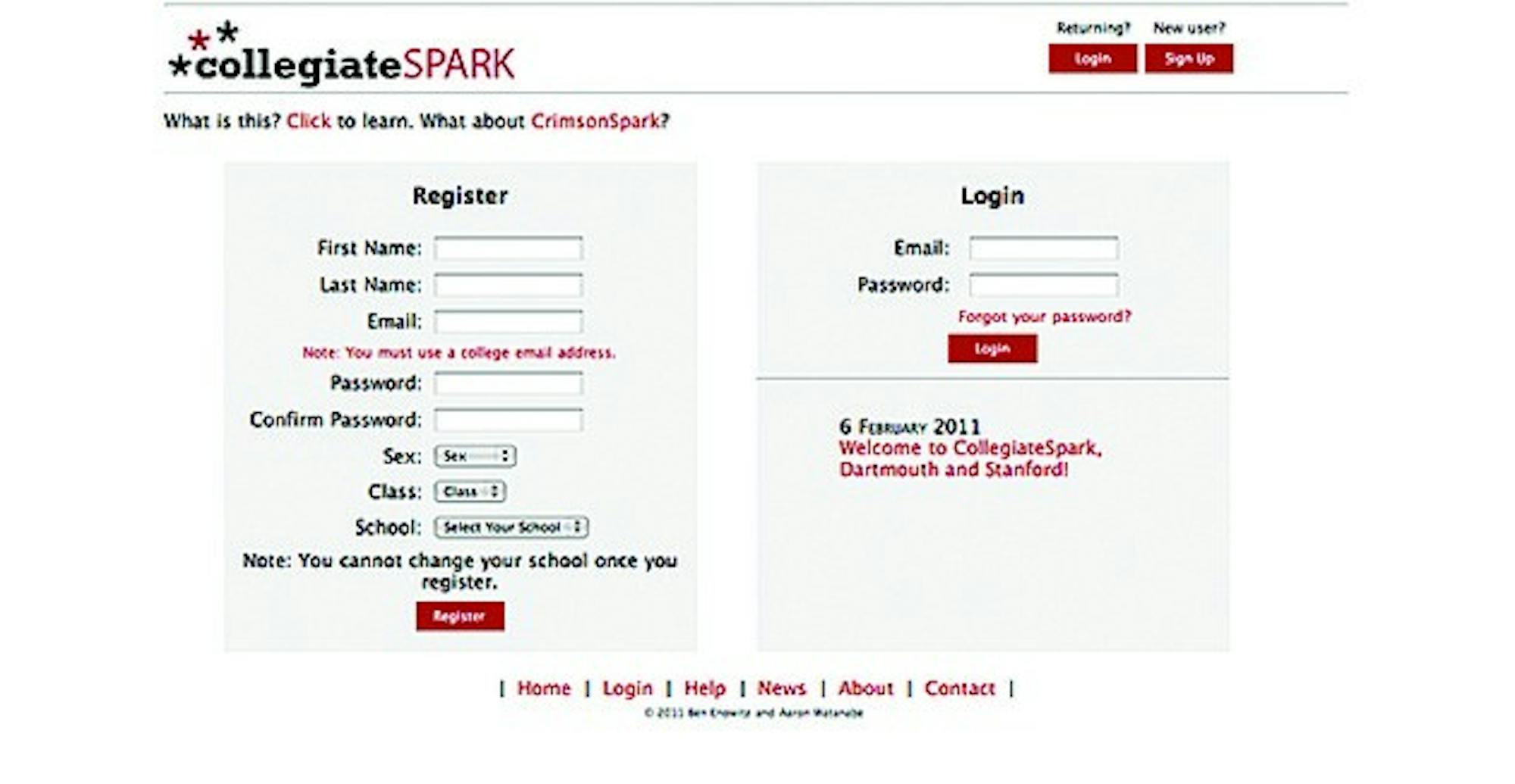Collegiate Spark, created by Watanabe and Harvard junior Ben Enowitz, serves as a middle ground between a social networking site like Facebook and a dating site like Match.com, according to Watanabe. The service is a "catalyst" for dating, meant to "spur relationships you've already started with people in your community," Watanabe said.
Collegiate Spark had 198 registered Dartmouth users as of Monday evening, and College users have experienced a total of 398 "sparks" and 94 matches, according to Watanabe.
Students can create a Collegiate Spark profile by providing their name, college e-mail address, class year and campus housing location, which is used to verify user authenticity. Users can search for other student profiles and choose to "spark" them, indicating romantic interest, according to Watanabe. The site also offers an option for suggesting a date activity and location, he said.
"Say that I met some nice girl in the dining hall and talked with her and would really like to get to know her better, but I feel very uncomfortable just asking her to get coffee at the Dirt Cowboy or something because I don't know her that well," Watanabe said. "So I can go onto this site and find this person and say I want to go on a date for coffee."
The information is stored by the site and kept private until the object of a "spark" indicates mutual interest, according to Watanabe.
"[It] won't tell anyone unless the other person goes on that site and remembers you and fills out that same form," Watanabe said. "Then there's a match and we'll send out an e-mail saying you have a match, and you can make plans to go on a date."
Watanabe and Enowitz created Collegiate Spark during fall 2010 as a final project for their computer science class, Watanabe said. They began developing the project in late November and launched the site at Harvard on Dec. 7 under the name Crimsonspark.
Over 200 students created profiles during the first night, and the site had over 1,600 registered users close to a quarter of Harvard's undergraduate population within a week, according to Watanabe. Growth has slowed since then, he said.
"This is the best-case scenario, exceeding expectations," Watanabe said.
Watanabe, a graduate of Hanover High School and the son of two Dartmouth professors, said the decision to expand to Dartmouth was made following conversations with several students at the College.
Sam Farnham '14 who attended high school with Watanabe also helped increase the site's popularity at Dartmouth, Watanabe said.
"We're gauging the response of other schools," Watanabe said. "It's very different when you're throwing it to another campus. I know five or six students very well because I went to high school with them."
The site's expansion to Dartmouth will act as an "experiment" to uncover underlying differences between the colleges by comparing results from Harvard and Dartmouth, Watanabe said.
Such differences may limit the success of the site at Dartmouth, according to Farnham.
"I do think it's a different culture here," he said. "You won't necessarily see people trying to find a date. I don't know that it'll be as successful as it was at Harvard."
Although many students have signed up for the site, they often wait to be "sparked" rather than sparking others themselves, thereby limiting the effectiveness of the site, Farnham said.
Positive student response at Dartmouth and Stanford may compel the creators to include more schools, particularly the other members of the Ivy League and the New England Small College Athletic Conference, Watanabe said.
"I've received e-mails from friends at other schools asking me to bring Spark to their colleges," he said.
True matches, which indicate actual romantic interest, are hard to assess because many students "spark" friends as a joke, he said.
Dartmouth students who have joined the site expressed mixed feelings about the site's use on campus when interviewed by The Dartmouth.
"My friend sent me the site hoping it would be the new Bored at Baker, but it isn't nearly as entertaining," a female member of the Class of 2014, who spoke on condition of anonymity, said. "It's a good idea but I'm not optimistic about its practical application. Basically, I'm still dateless on Valentine's Day."
Another female member of the Class of 2014 said she was curious about the site's future at Dartmouth.
"I think it's pretty cool and I'm interested to see how successful it is," she said.
Watanabe said his personal success with the site has also been minimal.
"I do have a profile, but I haven't had any matches unfortunately," he said. "But I got an A' in the class."




